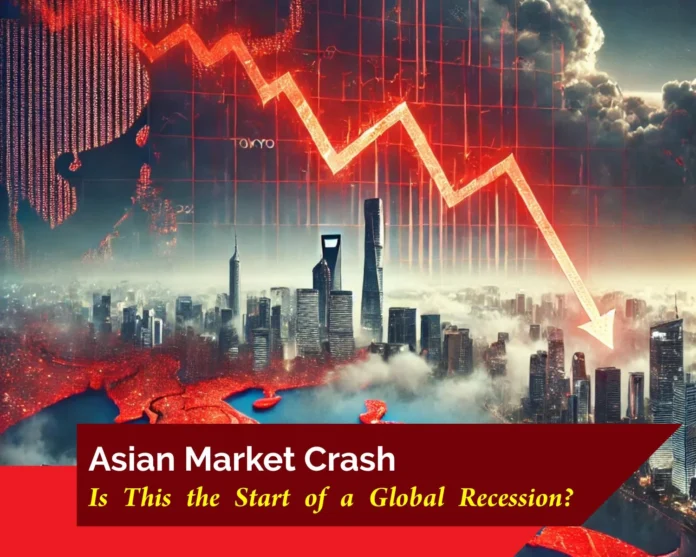Asian Market Crash: Introduction
The Asian market crash that unfolded at the start of the week has rattled global investors and reignited fears of a looming global recession. A cascade of sharp sell-offs, triggered by new US tariffs, sent shockwaves through major financial centers across the region—from Tokyo to Shanghai. Some market watchers now wonder whether this signals more than just a regional slump. Could it be the beginning of something far more serious?
Markets in Freefall
When trading opened on Monday, the impact was immediate. Stock indexes across Asia fell hard. Japan’s Nikkei 225 dropped 6%, while South Korea’s Kospi fell 4.7% and Australia’s ASX 200 lost 4%. The timing made matters worse for markets in China, Taiwan, and Hong Kong, which had been closed for public holidays the previous Friday and were just catching up with global losses.
The plunged over 6%, while the Hang Seng and Taiwan Weighted Index each slid by around 10%. Analysts described the scene as chaotic, with one calling it a “bloodbath” in a comment shared with media outlets.
The Trade War’s Ripple Effect
Much of this chaos traces back to new US tariffs, announced by President Donald Trump. These sweeping import taxes on goods from multiple countries—including key Asian exporters like China and Vietnam—have changed the outlook for global trade overnight.
Asian economies, which rely heavily on manufacturing and exports, are feeling the pressure first. The fear? A prolonged trade war could weaken demand from the US, one of their biggest customers. As Qian Wang, Asia Pacific chief economist at Vanguard, pointed out, higher tariffs now seem like a permanent fixture, and that’s a troubling sign for both short- and long-term growth in the region.
A Bigger Problem in the Making?
It’s not just about Asia. Economists are warning that this market turbulence might be the first signal of broader economic trouble. A significant slowdown in the US economy, triggered by rising costs and strained trade relationships, could easily spill over into other regions.
Julia Lee, Head of Investment at FTSE Russell, explained that tariffs are already affecting inflation expectations and fueling fears of a downturn. If demand in the US weakens, export-dependent economies across Asia would be among the first to feel the impact.
Global Markets Join the Slide
The effects didn’t stop in Asia. The S&P 500 dropped nearly 6%, capping its worst week since 2020. In the UK, the FTSE 100 slid almost 5%, and similar declines hit Germany and France. Investors worldwide seem to be bracing for more pain. US futures were also trading lower, pointing to continued losses on Wall Street.
The domino effect of the tariff war is becoming hard to ignore. As governments respond with retaliatory measures—like China did on Friday—market instability grows, making recovery even harder.
Investor Confidence Cracks
Confidence is quickly eroding. With little sign of diplomatic progress or policy clarity, investors are pulling back. The view from major investment firms is increasingly grim: the market may be entering a prolonged correction, not just a temporary dip.
This kind of sentiment rarely exists in isolation. When investors shift to defensive positions and cash out of stocks, it can signal larger worries—about corporate profits, employment, and even household spending.
Trillions Lost, Outlook Uncertain
Since the tariffs were announced, global markets have shed trillions in value. The scale of the losses has shaken even seasoned analysts. What’s becoming clear is that this isn’t just about stock prices—it’s about global economic stability.
The trade war is hitting the real economy: higher costs, lower trade volumes, shrinking margins, and greater uncertainty for businesses and consumers alike. And if the world’s two largest economies continue to clash, it may only get worse.
Conclusion: Warning Signs Everywhere
So, is this the start of a global recession? The answer isn’t certain yet—but the signs aren’t encouraging. Asia’s deep market plunge could very well be the first major signal that the global economy is entering a dangerous phase.
Without a meaningful shift in trade policy or international cooperation, the downward pressure on growth is likely to continue. For now, all eyes are on Washington, Beijing, and the financial markets that connect them.
Key Takeaways
- Asian stock indexes plunged amid tariff-driven panic selling.
- US tariffs are disrupting trade flows and export-driven economies.
- Investor sentiment has shifted toward fear and caution.
- Global markets are down, with trillions in value wiped out.
- The risk of a global recession is rising—and fast becoming a front-page concern.


